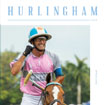Polo won’t be in the Olympics any time soon . . .
By Alex Webbe
For over 30 years the International Polo Federation has been beating the drum in an effort to get the sport of polo reinstated into the Olympics. After submitting a formal application to have polo considered as an “additional event” in the 2020 Tokyo Olympic Games, the age-old equestrian sport has been passed over in favor of baseball and softball, bowling, karate, roller sports, sport climbing, squash, surfing and wushu (martial arts). The afore mentioned sports were named finalist sports to be considered to be added for the Tokyo 2020 Olympics Games.
I am surprised that after 30 years of trying to get polo back into the Olympics the FIP never took the time to research the participation of polo in past Olympics. If they had they would have realized that in the five times that polo was part of the Olympics (1900, 1908, 1920, 1924 and 1936) there were never more than five countries participating.
They would also have discovered that many of the early teams were of mixed nationalities.
They would have found out that the first Gold Medal polo team in the 1900 Olympics, Great Britain, included American 10-goaler Foxhall Keene.
In 1908 only three polo teams participated and all three teams competing were from Great Britain and one Herbert Wilson was listed on the rosters of two of the teams-Roehampton and Hurlingham. Mr. Wilson finished in first and second place that year. Argentina only participated in the Olympics twice, once in 1924 in Paris and again in 1936 in Berlin, winning the Gold Medal both times.
The 1924 polo games in Paris took nearly two months to complete (rain and wet fields), and the inequity in team strengths once had a 6-goal US team (Comprised of four US Army officers who just happened to be stationed in Europe at the time) competing against the cream of Great Britain’s polo elite. The USA finished in third place (out of a field of four) with a 1-1 record. Spain was second and Belgium was fourth.
Another aspect that should be approached might be the handicapping of the teams. If it is to be a true Olympic competition then the top players from each of the participating countries should be allowed to compete, with Argentine fielding a 40-goal team. If the FIP limits the competition to 14 or 16-goals I can only imagine Adolfo Cambiaso expressing regret that he couldn’t represent his country in the Olympics because he was too good to make the team!
More recently they might want to look at some of the sports that have been cut from the Olympics, sports that need considerably less space required to facilitate a couple of dozen polo teams including fields, stables and practice facilities (baseball and karate).
Perhaps the FIP should focus on some of its earlier goals such as making all international rules and handicaps uniform? How’s that effort going?


